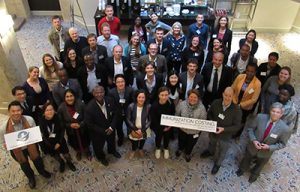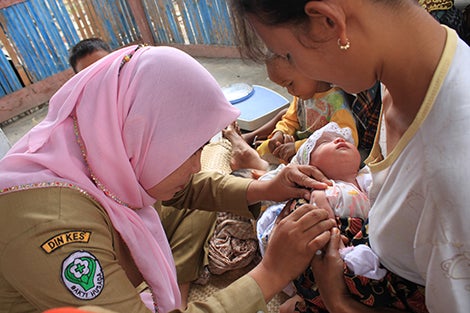July 21, 2016 — As new vaccines are introduced—some of them quite costly—accurate information on the cost and financing of national immunization programs can be lacking. Research and a new website developed at Harvard T.H. Chan School of Public Health and funded through the Bill and Melinda Gates Foundation are designed to help governments worldwide manage their immunization programs and plan for the future. They will also help donor organizations and donor nations as they make decisions on supporting such programs.
A team of 10 experts from Harvard Chan School has been working on the immunization costing project, called EPIC—Expanded Program on Immunization Costing and Financing. Stephen Resch, deputy director of the Center for Health Decision Science at Harvard Chan School, has served as advisor to EPIC since its inception in 2012 and has led the project’s second phase at Harvard Chan for the past two years.
The project began four years ago with immunization costing studies by researchers in six countries—Benin, Ghana, Honduras, Moldova, Uganda, and Zambia. In the project’s second phase, begun in 2014, the Harvard Chan group extended the work of the individual country studies by analyzing data on immunization costs from more than 300 health care facilities in the countries. They developed a website that is serving as the hub for all new information on immunization costing and financing studies. They also created a community of practice of over 200 experts in the field from around the globe, which will help foster collaborative projects and disseminate new findings.
The website—immunizationcosting.org—includes tools and questionnaires that can be used by countries or funding organizations to assess the true cost of immunization programs with a high degree of accuracy. The tools take into account a variety of factors—such as costs for the vaccines themselves, for their delivery, and for the vaccines to be administered. These tools can help countries assess net health care cost savings as a result of increased immunizations.
One of EPIC’s analyses, led by Nicolas Menzies, assistant professor of global health, has shown that service volume is by far the most important determinant of immunization costs. Immunization sites with a higher number of clients were found to have a substantially lower cost per fully immunized child compared to lower-volume sites. These findings could lead to shifts in how immunization services are organized.

A May workshop in Washington, D.C drew over 70 experts and policy makers to talk about the latest EPIC research and future priorities. The group looked at new immunization studies from Brazil, India, Ethiopia, Nigeria, Rwanda, Tanzania, and Kenya, as well as at previous EPIC studies. They discussed how immunization research findings can be translated into policy actions, how novel financing methods make immunization programs more efficient, and how to improve future immunization costing studies.
“We hope that our work, by bringing together experts from around the world to focus on immunization costing, will ultimately help nations provide immunization in the most efficient way possible, and thus lead to better protection against preventable diseases for many millions of people,” noted Christian Suharlim, postdoctoral researcher at the Center for Health Decision Science and project manager for EPIC’s second phase.
— photo of infant being vaccinated: Muhammad Yunus, Courtesy of Photoshare
— photo of immunization costing workshop courtesy Christian Suharlim
